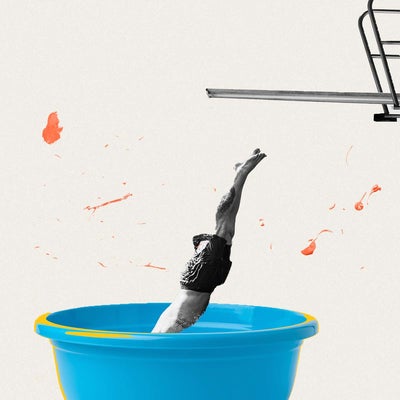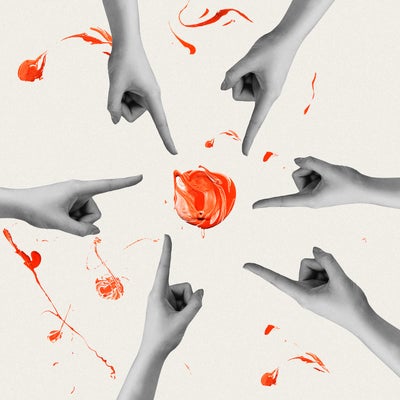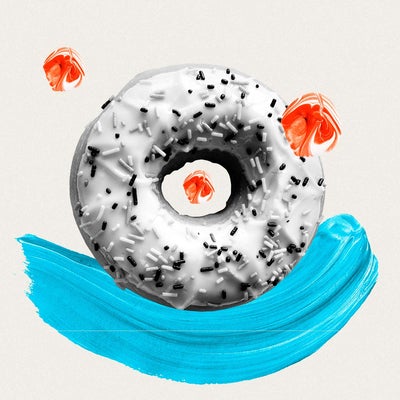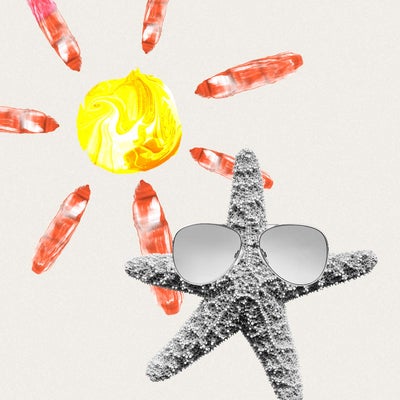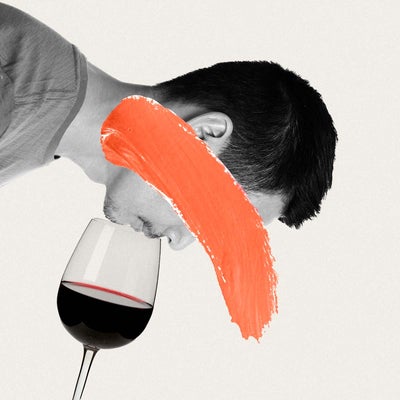
Popping Myths About Acne
In this article, you'll learn:
- You don’t get acne from dirt
- Your tan make look great but it won’t cure your acne
- Why many men don’t age out of acne
- Why it’s okay to use the right moisturizers on your face
- Why you don’t want to spot treat acne
- Why stress may not be the cause of acne (but it doesn’t help)
- Why you shouldn’t pop your own zits
- Why you want to save your toothpaste for your teeth
Many people think acne is a plague of adolescence, like physics class. But that's wrong. For many men in their 20s, 30s, 40s, and older, who are years removed from their last physics class, acne can still be an everyday reality.
There are other myths about acne. Here are eight of them.
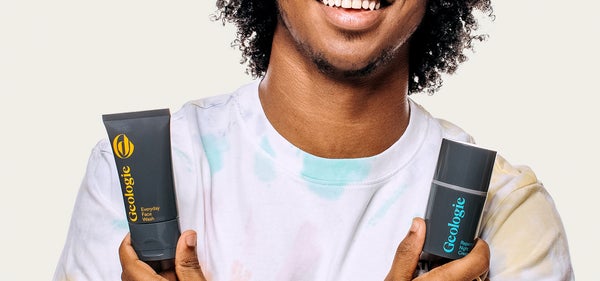
Myth #1: Acne is caused by dirt
We asked Dr. Steve, our favorite world renowned dermatologist, if one factor behind an acne breakout is dirt or failure to wash your face. The good news is that acne is not caused by dirt, and it’s not caused by being unclean.
“Acne is part of something called the follicular triad — a combination of oil you produce and bacteria that's on all of our skin called Proteobacteria (p acnes) in the hair follicle. The third part of the triad is the inflammation that happens as that bacteria interacts with the oil your skin produces," said Dr. Steve.
“It’s a fairly complex inflammatory condition that connects your genetics, what lives on your skin, and your immune system."
That said, a good skin routine with the right ingredients will go a long way toward interrupting the acne triad. We recommend the Geologie Essential 2-Step Acne Treatment Trial or The Essential 2-Step Acne Treatment Trial Sensitive, for those with sensitive skin.
Myth #2: Getting a tan helps clear up acne
Dealing with acne by getting a great tan feels like a throwback to a previous era -- one where we didn’t have to worry about scary skin cancers like melanoma and didn’t know how sunlight can make you look like an old saddlebag.
Dr. Steve says there is data that suggests UV light can be beneficial for acne because sunlight can do a number on the p acnes bacteria. “There is a treatment dermatologists use called photodynamic therapy,” he says. “We use it when vitamin A doesn't work that well. Imagine putting on the opposite of sunscreen -- the therapy makes skin really sensitive to light, and we shine a blue light that is very effective for acne."
Still, he says, the best solution for most men with acne is still topicals containing salicylic acid and retinol. “They’re much more effective and safer.”
Myth #3: Acne will go away on its own
For many people, acne is a nuisance of adolescence. As you go through puberty, your hormones increase substantially, which affects what oils you produce in your skin. But acne isn’t just a young person’s issue. In fact, 73% of Geologie users aged 25-34 say that acne is a problem.
“For many, acne stays through their twenties, thirties, and even forties and beyond,” Dr. Steve says. “What’s more,” he adds, “chronic, long-term acne can run in families. So for many men, the best solution is to find and stick with a long-term treatment.”
Myth #4: Don't moisturize acne, your skin needs to be dried out
Many men believe that the best solution to acne is to dry the skin out, so they avoid using moisturizers. “This is a myth, “ according to Dr. Steve. “Acne skin is more sensitive and has more water loss than normal skin.”
The problem with moisturizers is that some of them can be oily and thick. “That traps the oil your skin produces," said Dr. Steve. "And that makes acne worse.”
What men with acne should be looking for are moisturizers that are non-comedogenic. So moisturizing is not something men with acne have to avoid completely. In fact, he says, many acne treatments dry out your skin, so moisturizing is helpful and necessary to increase your tolerance.
“Moisturizers are good for acne,” said Dr. Steve. “You just have to find one that doesn't clog your skin.”
Myth #5: It's best to spot treat acne
When faced with a pimple, most of us figure the best thing to do is to treat that individual blemish. According to Dr. Steve, that is the wrong course of action: “Acne is a field issue, a full face issue, that is forming weeks before it shows up -- the oil, the occlusion, the comedone. So it is far better to treat the wider areas where you're getting acne.”
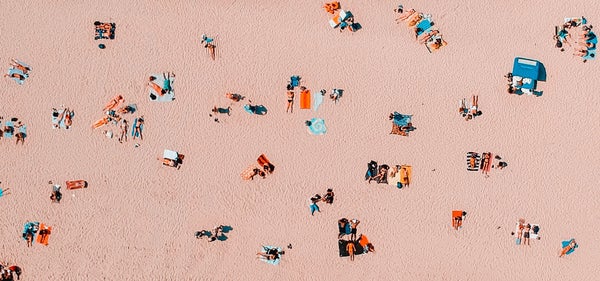
Myth #6: Stress causes acne (or at least makes it worse)
This one may be partly true. It's been hard to prove that stress has anything to do with acne, and so dermatologists usually look to the follicular triad mentioned above (you know, bacteria, oil, and inflammation).
On the other hand, said Dr. Steve, "anecdotally, many of my patients report that dealing with acne can be worse around certain events like interviews, and dates," he said.
“There is certainly a nerve skin axis,” he says, “but it's kind of hard to prove and measure stress continuously.”
Myth #7: It’s okay to pop your own zits
For most guys with acne, there is nothing more soul satisfying than a well popped pimple. Unfortunately, per Dr. Steve: “Popping your own pimples usually won’t help you get the outcome you want, which is to get the microorganisms out of your skin. In fact, zit popping can spread the microorganism inside your skin, which can trigger a worse acne lesion. As a result it takes longer to heal and may even increase your risk of scarring.”
Myth #8: Toothpaste can treat acne
Using toothpaste on pimples is yet another one of those hacks that seems great but isn’t. The reason it got started is that in the past, some toothpastes contained an ingredient called Triclosan, a chemical that kills bacteria, including the P. Acne bacteria that causes acne.
Also, toothpaste can contain baking soda, alcohol, and hydrogen peroxide, all of which can dry out skin, which may shrink pimples. Finally, the menthol in toothpaste can create a tingly feeling that reduces pain and swelling, albeit temporarily.
According to Dr. Steve, however, there are several reasons why you shouldn’t use toothpaste as an acne treatment. “First of all, toothpaste is formulated for your hard enamel-covered teeth -- not the sensitive skin on your face.” Simply put, the chemicals are too strong for your dimples.
Also, toothpaste can irritate your skin. “Toothpaste has a basic pH level and can irritate healthy skin, which has a naturally acidic pH,” says Dr. Steve, who notes that upsetting your pH with too much baking soda could lead to rashes and burning.
The Take-Away: Find a Regimen that Works for You and Stick With It
Fortunately there are ingredients that can help with acne. The salicylic acid in the face wash is a great liquid exfoliator, and the retinol in the night cream can modulate oil production and help generate fresh healthy skin cells.
For guys with normal skin, try the Essential 2-Step Acne Treatment Trial and The Essential 2-Step Acne Treatment Trial Sensitive for those with sensitive skin.
But, Dr. Steve adds, don’t expect an overnight cure. He recommends sticking with these treatments for at least 90 days in order to see the best results.
Try the quick diagnostic today.



